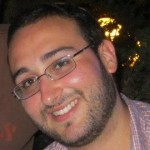Musings from Students of the Pardes Institute of Jewish Studies in Jerusalem
Posted on January 9, 2014 by Hirsch Fishman
David Gutbezahl (Year ’13) reflects upon the year that
he spent at Pardes:
 Within every Jew there is planted a seedling. This seedling, the desire to learn Torah, has the ability to grow into one of the most beautiful trees in the world, the Tree of Knowledge. While it is true that trees can grow strong within their own environment, the world that many of us live in can not at all be considered a naturally conducive environment for the growth of our little seedlings into majestic Trees of Knowledge. The distractions of life (going to college and finding a job) alongside the distractions of culture (watching Breaking Bad or reading Game of Thrones) are often so overpowering that even taking a minute to nurture our little seedlings, that need for Torah learning, is often pushed aside. While it can be true that some people do learn, and do manage to cultivate gorgeous Trees of Knowledge in this environment, many are left unaware, leaving them with stunted trees. You, however, are aware of this, and if you are considering going to study in Israel that means that you are the type of person that wants to grow, that wants to learn Torah at all costs.
Within every Jew there is planted a seedling. This seedling, the desire to learn Torah, has the ability to grow into one of the most beautiful trees in the world, the Tree of Knowledge. While it is true that trees can grow strong within their own environment, the world that many of us live in can not at all be considered a naturally conducive environment for the growth of our little seedlings into majestic Trees of Knowledge. The distractions of life (going to college and finding a job) alongside the distractions of culture (watching Breaking Bad or reading Game of Thrones) are often so overpowering that even taking a minute to nurture our little seedlings, that need for Torah learning, is often pushed aside. While it can be true that some people do learn, and do manage to cultivate gorgeous Trees of Knowledge in this environment, many are left unaware, leaving them with stunted trees. You, however, are aware of this, and if you are considering going to study in Israel that means that you are the type of person that wants to grow, that wants to learn Torah at all costs.
Of course, you can’t just get up and go to Israel, right? There are considerations that you need to make, and I’m not talking about cost and travel plans. Those are important too, but you are going to Israel to learn Torah, so most importantly you need to know where to study. Look, there are a lot of places, amazing places to study at, and I’m sure you’ve looked into a few of them. Chances are, for many people, you’re leaning toward a more traditional Orthodox Yeshiva. The soil within such a yeshiva is amazing, your knowledge of Torah will grow immensely at such a place. Yet, you have to ask yourself whether the teachers there are really the caretakers that you want. When a tree is planted in an open space with strict care, they tend to grow straight up toward the heavens. Other trees, grown more naturally, shape themselves around the wind and the need to reach sunlight, creating twisted, natural forms. (The Japanese call this aesthetic Wabi-Sabi). The first tree is what is grown at a more traditional yeshiva The teachers and students at a traditional yeshiva are all magnificent, but they have a set of beliefs and practices that they all follow, and they plan to have you follow too.
I’m not saying traditional yeshivas are wrong; both types of trees have their own beauty, and you really have to decide for yourself what you want, but I personally prefer the wabi-sabi Tree of Knowledge. This is what a place like Pardes (and I’m pretty sure Pardes is the only place truly like Pardes) helps you grow. At Pardes, you are accepted for you, and you aren’t pressured to change that at all. Pardes doesn’t try to turn you into a frum Jew. You might become one afterward, but that’s only because it was your own natural development alongside Torah learning. The soil is rich for growth at Pardes, and the teachers are excellent caretakers providing you with knowledge to feed your yearning alongside the guidance to open the world of Jewish learning so that you may form your own relationship with Judaism.
I spent a year at Pardes, and it most definitely changed my life. My relationship with Judaism and with the Divine are stronger than ever because of Pardes, and my practices are most definitely stricter than they were beforehand. There is absolutely no denying that my knowledge of Judaism and learning abilities have increased exponentially. However, am I a different person because of my time at Pardes? No, I don’t think so. Pardes helped me to grow naturally, it’s given me the push to become the person that I’ve wanted, no, needed, to be, and I’m still growing into that person that I believe I’m meant to be. That’s really what makes Pardes so special, other places will tell you what you need to be, but Pardes helps you grow into the person you’re naturally meant to be.